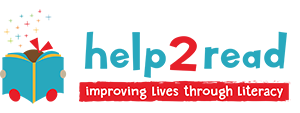Five ways you can create a culture of reading at home
27 August, 2018
His name is Jabu*; he is 9 years old in Grade 3. Jabu had unusual levels of stress for a child his age. What might be the problem you ask? He cannot read. Every morning he has to think over and over about what he will face today at school. It could be anything from fear, ridicule, shame and so much more.
Jabu might be a fictional character but the truth is the importance of reading for young children can never be emphasized enough. In our work with children, we have identified various reasons that may contribute to children who struggle with reading. One particular issue is that the home environment is not conducive to reading or early literacy development.
Here at help2read, we believe a home environment that fosters a love of reading is instrumental in helping children learn to read. In fact, recent research considers a home that encourages reading to be one of the foundational pillars in raising a strong reader.
Below, we’ve drawn up five key questions that can assist you in creating a literacy-rich environment at home.
One: Does your home foster an environment for early literacy?
The home is an important place for a child to develop a love for books and reading. Create a space in the house where you enjoy reading together. If space is an issue, have a reading bag that they know is filled with all the material that they can use to enjoy reading; a book, a pencil and paper can be your most basic book bag with a magazine/newspaper and scissors – if they are scissor ready – to identify and cut out words/images they recognise from your reading adventures. This bag or reading corner must be accessible to them at all times. Be patient and encouraging as you build this into a family ritual.
Two: Do your children have access to reading resources?
A lack of reading resources cannot be the only reason why we cannot read to children. Enjoying membership to your local library can be an avenue to access books and a space they can positively identify for reading. There are also free resources in newspapers and magazines in the form of comic strips that you can cut out together and enjoy. A mix of reading materials also encourages children to find stories everywhere around them and you can help in this regard.
Three: Are you a reading role model?
This is probably one of the most important ways we can create a culture of reading in our homes. Do you read yourself? Do they see you read? You can model this behaviour if you hope for long-lasting reading habits in your children. Make reading time a family affair and lose all your inhibition. Demonstrating your love for reading, or reading as an alternative leisure activity is a sure way for children to make the right connections between fun and words.
Four: Do you tell stories?
Storytelling and talking are the easiest activities that we can share with children. This is an age-old tradition that has stood the test of time even with digital technologies within reach. The ability to travel through stories sends all the right messages and marks creative learning as an enjoyable activity. Tell your children stories from your childhood, from the books you read, your experiences, and a topical story. Let them ask questions and explore the different ways the story could have gone. This stimulates their cognitive abilities and language construction amongst many other things. More words is definitely more learning.
Five: Do you make time for reading?
The key to any reading activity is repetition. Making even 15 min every day for reading really goes a long way. It develops the habit and encourages the child to take up a book should you not be available. Your child can follow his/her interests through the resources you collect or make together. Use whatever time you have and this includes while you’re driving, walking or working around the house. This time is valuable.
I hope you have received what you need to get started into turning your home into a portal for word magic!
*Jabu is a fictional name and does not refer to a particular child enrolled in our Reading Help Programme

Registered SA Non-Profit 063-979 PBO 930027054 UK Charity Reg No. 1109567 Registered Office: Oak Farm Cottage, Mill Street, Gislingham, Suffolk, IP23 8JT





